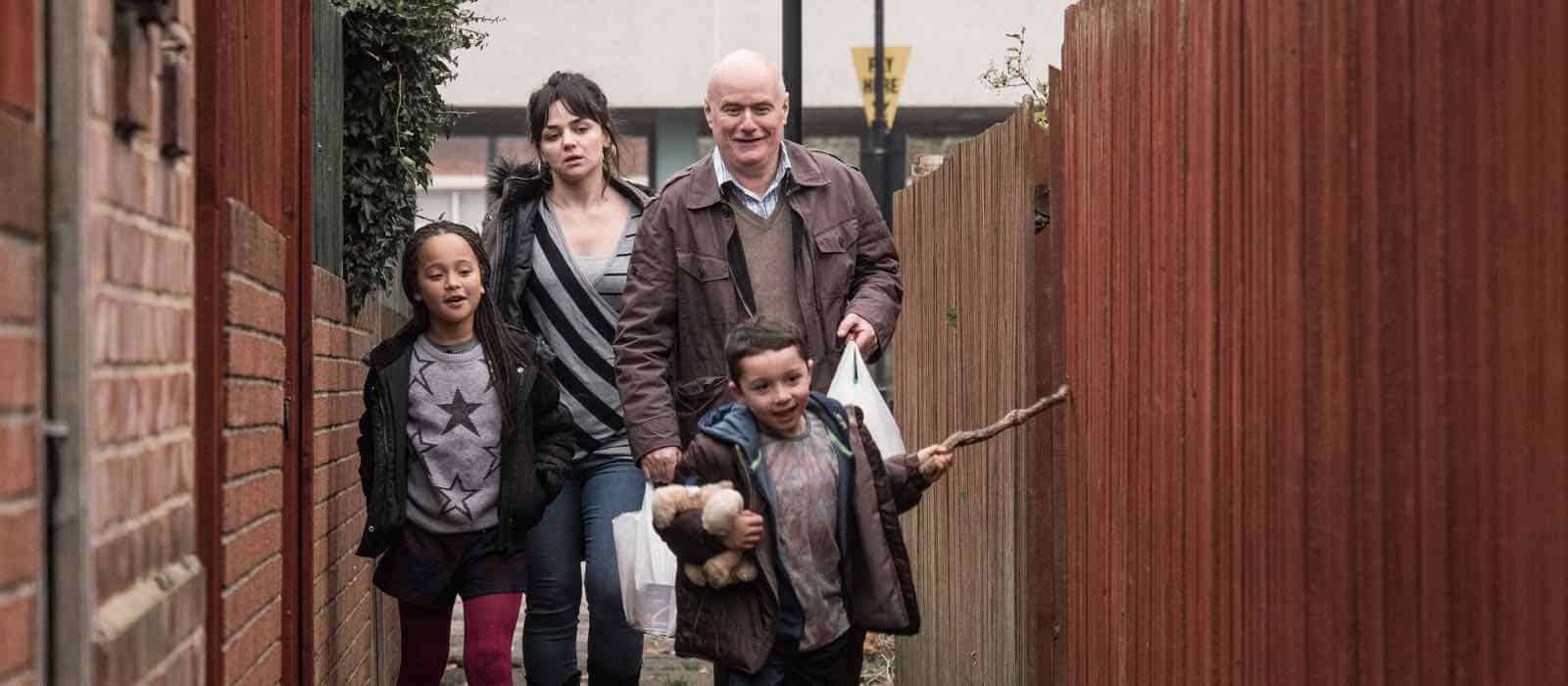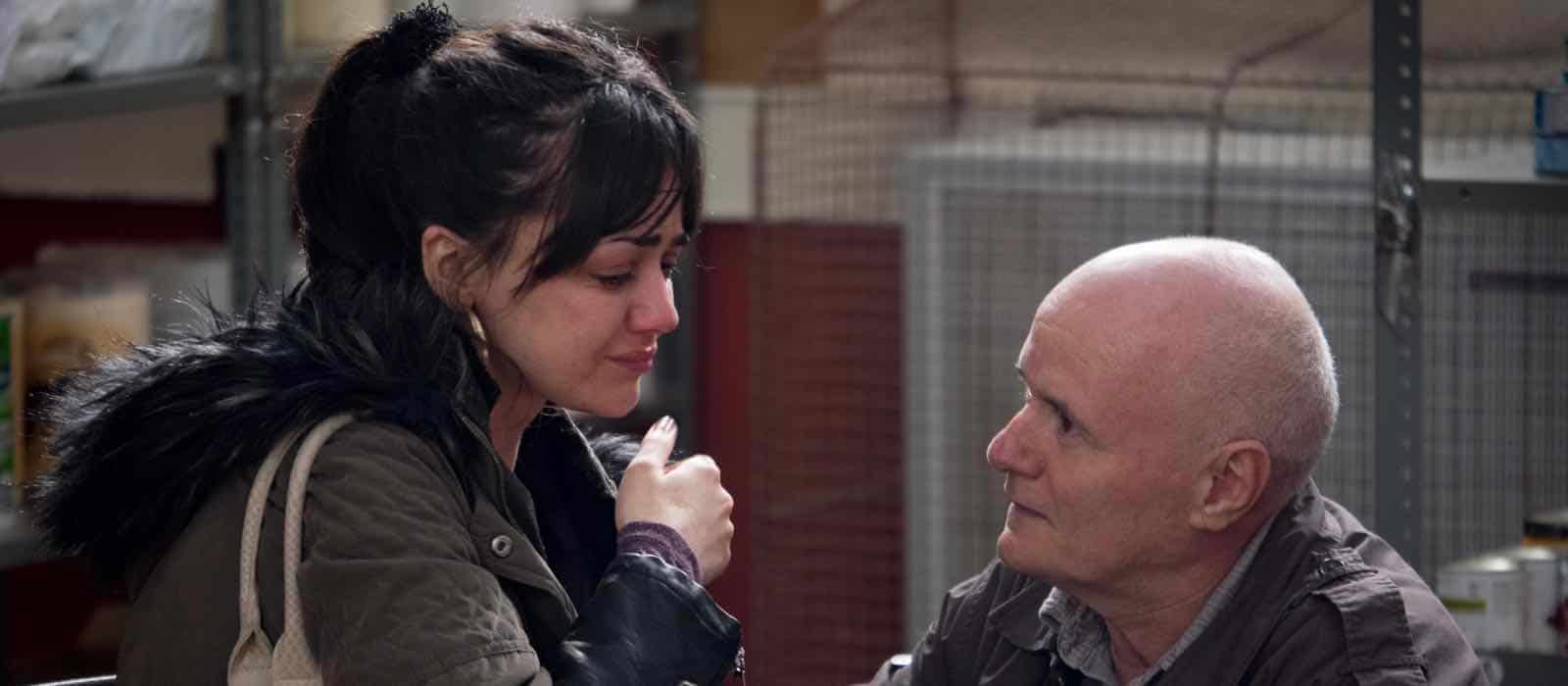Ken Loach’s Palme D’Or Winner I, Daniel Blake is a bracing call-to-action against bureaucratic failures to treat citizens like people. But it falters by making its hero uncontroversially the Deserving Poor without challenging this as a concept. This review was originally published on December 30, 2016, and has been re-published for the film’s Canadian release.
In the opening scene of I, Daniel Blake, the movie’s hero is invisible. The screen is black, and we hear Dan (Dave Johns) being interviewed by Amanda, a representative from the Department of Work and Pension. Amanda asks him yes or no questions, and when Dan chafes or elaborates, she cuts him off. She is unable to see him as a person — that’s against the rules.
[clickToTweet tweet=”Loach models the necessity of class solidarity when government’s “safety net” is under threat. ” quote=”Loach models the necessity of class solidarity, in an era when government’s “safety net” is under threat. “]
By paring their interaction down to the auditory, director Ken Loach depicts bureaucracy as a kind of sensory deprivation: it reduces messy lives to neat checkboxes; it blocks out information, while purporting to supply it. As the film unfolds, though, we learn Dan’s story. He is a longtime carpenter and recent widower living in Newcastle. After suffering a major heart attack, he applies for — and is denied — disability benefits. The movie tracks his nightmarish appeal process, and the strength he finds in an unlikely ally.
[clickToTweet tweet=”Ken Loach depicts bureaucracy as…sensory deprivation: it reduces messy lives to neat checkboxes” quote=”Ken Loach depicts bureaucracy as a kind of sensory deprivation: it reduces messy lives to neat checkboxes”]
The very premise of the movie speaks to bureaucracy’s ineptness: as Dan awaits his appeal, his only chance to receive government aid is through Job-Seeker’s Assistance. Even though doctors deem him too sick to work, Dan must show the state he is looking for jobs — attending CV workshops, contacting employers, scheduling interviews, etc. By default, the system treats citizens like freeloaders. Social workers are disciplinarian and cruel, even when Dan admits that he has a hard time with computers. “You give me a plot of land and I can build you a house, but I’ve never been near a computer,” he says.
Read more: Review: American Honey discards real emotions for pointless objectification >>
In truth, Dan is anything but lazy. At the doctor’s office, the first thing he asks is “When can I get back to work?” and, on his way home, he stops to buy lumber. We watch him building a bookshelf, as classical music plays in the background. Dan is at peace when he is doing what he is good at — building something of utility. Later, when he sells all his belongings to cover his expenses, he refuses to give up his toolbox.
[clickToTweet tweet=”The movie depicts Dan as a lifelong caretaker whom the state fails to care for in return.” quote=”The movie depicts Dan as a lifelong caretaker whom the state fails to care for in return.”]
The movie depicts Dan as a lifelong caretaker whom the state fails to care for in return. We learn that his wife had mental health issues and that Dan spent years “taking care of the missus,” as he says, before she passed away. When he gets a call saying his coverage has been declined, a photograph of his wife hangs in the background. It is easy for us to empathize with Dan because he is a common man but uncommonly good.
Read more: Age in Place: Kleber Mendonça Filho’s Aquarius >>
However, Dan’s “goodness” also raises questions. Is it his character that qualifies him for government support? If so, is it realistic? Here, the movie fails to challenge the idea that there is a Deserving Poor and an Undeserving Poor, and that these categories can and should be distinguished. To me, this is a distraction: everyone deserves a helping hand.
[clickToTweet tweet=” It is easy for us to empathize with Dan because he is a common man but uncommonly good.” quote=” It is easy for us to empathize with Dan because he is a common man but uncommonly good.”]
Dan, for example, is always willing to offer one. At the JobCentre, he overhears a social worker threatening to “sanction” Katie, a mother of two, for arriving a couple minutes late to an appointment. He intervenes, asking other people in the waiting room if they would allow Katie to go ahead. The strangers are happy to help, but the system does not allow for this flexibility, this humanity. It does not reflect how citizens actually feel about each other.
Through Katie and Dan’s friendship, Loach models the necessity of class solidarity, in an era when government’s “safety net” is under threat. When the pair is kicked out of the JobCentre, they leave together. Because Katie just moved from London, she doesn’t have a job yet. Dan fixes up her apartment and looks after the children. In one gut-wrenching scene, Dan takes Katie to a food bank. She is so hungry that she breaks into a can of beans and starts eating them in public. When a volunteer sees her, Katie is mortified — but Dan gets on his knees to comfort her. “It’s not your fault,” he says.
[clickToTweet tweet=”The system does not allow for this flexibility, this humanity.” quote=”The system does not allow for this flexibility, this humanity.”]
At the same time, Katie is more than a damsel in distress; she is a teammate. When Dan is depressed, Katie sends her daughter, Daisy, to his doorstep, bearing couscous. “Did you help us?” She asks, through the mail slot, when Dan won’t open the door. “Of course,” he says. “Then why can’t we help you?” It is Katie who takes Dan to his appeal hearing and holds his hand in the meeting.
[clickToTweet tweet=”Dan discovers that he is one of many…What if the system’s victims came together? Then what?” quote=”Dan discovers that he is one of many. This is both the tragedy of his story, and his best hope: what if the system’s victims came together? Then what?”]
The title I, Daniel Blake is an act of self-naming, a declaration of personhood in the face of a system that fails to treat people with dignity. It comes from what Dan spray-paints on the walls of the JobCentre, when his patience finally breaks: “I, Dan Blake, demand my appeal date before I starve.” Passersby cheer, chant, and take selfies at Dan’s side. One man stops to give him a jacket. By taking his suffering public, Dan discovers that he is one of many. This is both the tragedy of his story, and his best hope: what if the system’s victims came together? Then what?
Read more: Writer-director Ashley McKenzie talks Werewolf >>



